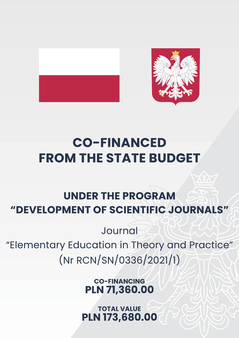Theoretical assumptions shaping creative attitude in preschool children
Abstract
Aim of this paper is to present some theoretical and practical aspects of the development of creative attitude in preschool children. Firstly, the clarification of terminology was presented, introducing the broad theme of creativity, one’s own activity, creative activity and creative attitude of the child. Due to the variety of creative approaches to the child we have chosen humanistic approach which indicates that the child is creative. Creativity manifests itself in child's own activity, creating works that are the result of his imagination, which organizes and transforms the information from the outside world. It is linked to the development and is driven by the need to grow. In the second place, we drew attention to the factors that favor the development of creative attitude in preschool children. The division on the conditions, context and environment helps to understand the complexity of this phenomenon. It also provides concrete evidence for the practice of teaching. At the end of the article we examine the basis of pre-school education program published in 2009 in order to identify the objectives and content that stimulate the development of children's creative attitude. The main demand and the application that results from an analysis of the literature is to help the teacher to notice and to realize that his job is to create an environment in which children can freely express themselves, and process the new reality for self-realization. The need for change in the approach to the role of the teacher was noted. He is to be a child companion, creating for him the situations to resolve.
References
Edukacja kreatywna, red. E.A. Zwolińska, Wydawnictwo Akademii Bydgoskiej, Bydgoszcz 2005.
Feriere A., Breve initiation a l’Education Nouvelle, Ed. Bourrelier, Paryż 1951.
Gloton R., Clero C., Twórcza aktywność dziecka, przekł. I. Wojnar, WSiP, Warszawa 1976.
Karbowniczek J., Kwaśniewska M., Surma B., Podstawy pedagogiki przedszkolnej z metodyką, Akademia Ignatianum, Wydawnictwo WAM, Kraków 2012.
Klus-Stańska D., Konstruowanie wiedzy w szkole, Wydawnictwo UW-M, Olsztyn 2002.
Klus-Stańska D., Nowicka M., Sensy i bezsensy edukacji wczesnoszkolnej, WSiP, Warszawa 2005.
Kujawiński J., Rozwijanie aktywności twórczej uczniów klas początkowych, WSiP, Warszawa 1990.
Malicka M., Uroki i trudy twórczego życia, Wydawnictwo NK, Warszawa 1982.
Mądrzycki T., Psychologiczne prawidłowości kształtowania się postaw, WSiP, Warszawa 1977.
Podstawa programowa wychowania przedszkolnego dla przedszkoli, oddziałów przedszkolnych w szkołach podstawowych oraz innych form wychowania przedszkolnego, Dz. U. z dn. 15 stycznia 2009 r. nr 4, poz. 17.
Popek S., Zdolności i uzdolnienia twórcze – podstawy teoretyczne, [w:] Aktywność twórcza dzieci i młodzieży, red. S. Popek, WSiP, Warszawa 1988, s. 9-39.
Przetacznik-Gierowska M., Zmiany rozwojowe aktywności i działalności jednostki, [w:] Psychologia rozwoju człowieka, red. M. Przetacznik-Gierowska, M. Tyszkowa, PWN, Warszawa 2000, s. 151-189.
Puślecki W., Wspieranie elementarnych zdolności twórczych uczniów, Impuls, Kraków 1999.
Read H., Wychowanie przez sztukę, Ossolineum, Wrocław-Warszawa-Kraków-Gdańsk 1976, [Wstęp I. Wojnar, s. XLVII].
Schulz R., Twórczość – społeczne aspekty zjawiska, PWN, Warszawa 1990.
Szmidt K. J., Pedagogika twórczości, Pedagogika GWP, Gdańsk 2007.
Szuman S., Aktywność własna jako czynnik rozwoju dziecka w okresie 7-14 lat, „Nowa Szkoła”, (1956) 6, s. 565-567
Tyszkowa M., Aktywność i działalność dzieci i młodzieży, WSiP, Warszawa 1977.
Uszyńska-Jarmoc J., Od twórczości potencjalnej do autokreacji w szkole, Trans Humana, Białystok 2007.
Wojnar I., Humanistyczne intencje edukacji, Wydawnictwo Akademickie „Żak”, Warszawa 2000.
Wojnar I., Przedmowa do wydania polskiego, [w:] R. Gloton, C. Clero, Twórcza aktywność dziecka, przekł. I. Wojnar, WSiP, Warszawa 1976, s.13-33.
Copyright (c) 2012 Elementary Education in Theory and Practice

This work is licensed under a Creative Commons Attribution-NoDerivatives 4.0 International License.
- When submitting a text, the author declares that he/she is the Author of the article (hereinafter referred to as the “Work”) and:
- he/she owns the exclusive and unlimited copyright to the Work,
- is entitled to dispose of the copyright to the Work.
Declares that it does not infringe any third party copyrights or legal rights.
Declares that there is no conflict of interest.
2. At the same time, the Author grants the Ignatianum University in Cracowa royalty-free, non-exclusive and territorially unlimited licence to use the Work in the following fields of exploitation:
- recording the Work in a hard copy, as well as on a digital or magnetic medium;
- reproduction of the Work using any technique, without limitation of the number of editions or copies;
- distribution of the Work and its copies on any medium, including marketing, sale, lending, and rental;
- introduction of the Work into a computer memory;
- disseminating the Work in information networks, including in the Internet;
- public performance, exhibition, display, reproduction, broadcasting and re-broadcasting, as well as making the Work available to the public in such a way that everyone can have access to it at a time and place of their own choosing;
- within the scope of dependent rights to the Work, including in particular the right to make necessary changes to the Work resulting from editorial and methodical development, as well as to translate the Work into foreign languages;
The licence is granted from the moment of the transfer of the Work to the Ignatianum University in Cracow. The Ignatianum University in Cracow is entitled to grant further sub-licences to the Work within the scope of the right granted. The licence is time-limited and it is granted for a period of 15 years, starting from the date of its granting.
Authors are permitted and encouraged to publish their text online (e.g. in their institution’s repository or on the institution’s website) before or during the submission process as this may lead to beneficial exchanges, as well as earlier and greater citation of the published text (See The Effect of Open Access). We recommend using any of the following portals of research associations:
- ResearchGate
- SSRN
- Academia.edu
- Selected Works
- Academic Search





